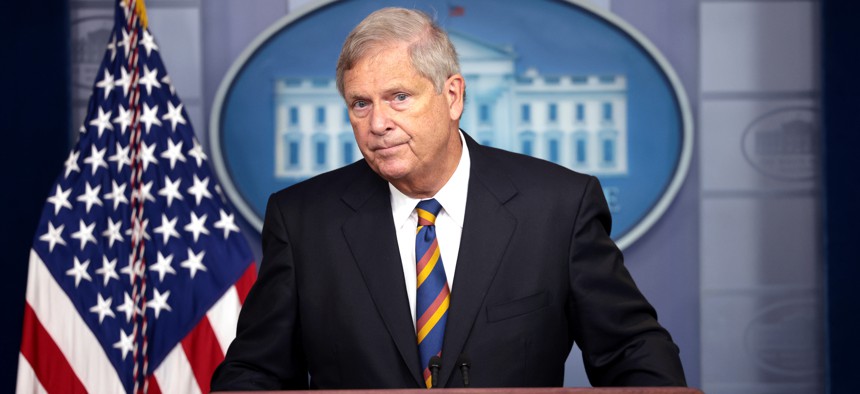WIC program on pace to fall $1B short, says agriculture secretary

Agriculture Secretary Tom Vilsack said the WIC program doesn't have enough funding to meet the higher demand and will run out of money. Kevin Dietsch via Getty Images
Unless Congress budgets more, the program will run out of money in mid-August, forcing states to waitlist those seeking help.
Unless Congress acts, funding for a program to provide food to 6.7 million pregnant women, new mothers and their children will run out of funding around mid-August, said Tom Vilsack, secretary of the Department of Agriculture, on Thursday.
The number of women and children on the Special Supplemental Nutrition Program for Women, Infants, and Children, or WIC, has grown by 400,000 people this year, which is much more than anticipated. As a result, the department and states have had to spend the current year’s funding for the program faster.
Vilsack told reporters the program is on pace to fall $1 billion short of what it needs to fully fund the program through the end of the fiscal year on Sept. 30. It will run out of cash about a month and a half early.
The past two continuing resolutions passed by Congress to keep the government running did not increase funding to meet the higher demand. Senate Democrats have called for increasing spending by $1.4 billion in a budget deal.
Senate Majority Leader Chuck Schumer on Wednesday said Congress does not have enough time to reach agreement on the 12 appropriations bills before the first part of a shutdown begins next Saturday. He is moving to pass yet another continuing resolution to keep the government running, but it’s uncertain that House Republicans will go along.
But a continuing resolution doesn’t mean increased funding. States will still be facing uncertainty over whether they will “be confronted with major shortages at the end of the fiscal year,” Vilsack said.
In an analysis last month by the left-leaning Center on Budget and Policy Priorities, states would need to reduce WIC participation by roughly 2 million people by September if Congress does not budget more. That could mean states may have to start saving money by putting certain classes of people on waiting lists.
Under the department’s regulations, the first people who would be turned away would be non-breastfeeding postpartum women. Next, children between the ages of 1 and 5 who do not have high-risk medical issues would be rejected. “If that doesn't satisfy the shortfall,” Vilsack said, “then the next category are pregnant and breastfeeding women.”
Eventually, all types of women and children would be turned away. “The longer Congress puts off fully funding WIC, the greater the risk grows to moms, babies and children who need and are seeking nutrition and health support from the program,” he said.
Paul Throne, Washington state’s WIC director, said his caseload has been growing for years. “My budget is stretched,” he said. “I'm afraid that this year I may no longer have the budget to serve everyone.”






